PHIL2005: Examining Karl Popper's Falsificationism in Science
VerifiedAdded on 2023/06/07
|5
|1279
|72
Essay
AI Summary
This essay delves into Karl Popper's Falsificationism, a theory that contrasts with inductivism by asserting that scientific theories cannot be proven but can be falsified through contradictory observations. The essay discusses Popper's criticism of positivism, highlighting that theories should be testable an...
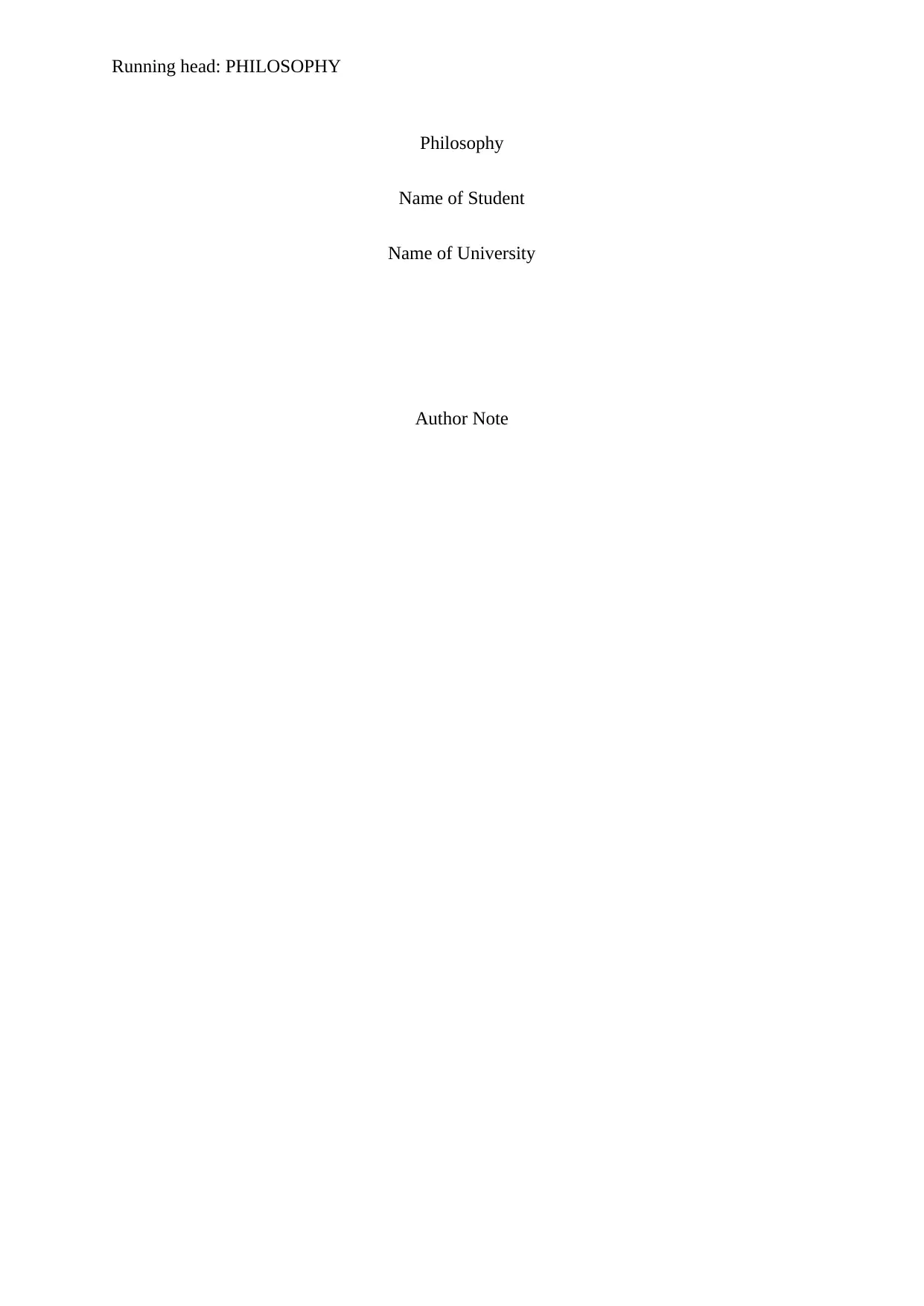
Running head: PHILOSOPHY
Philosophy
Name of Student
Name of University
Author Note
Philosophy
Name of Student
Name of University
Author Note
Paraphrase This Document
Need a fresh take? Get an instant paraphrase of this document with our AI Paraphraser
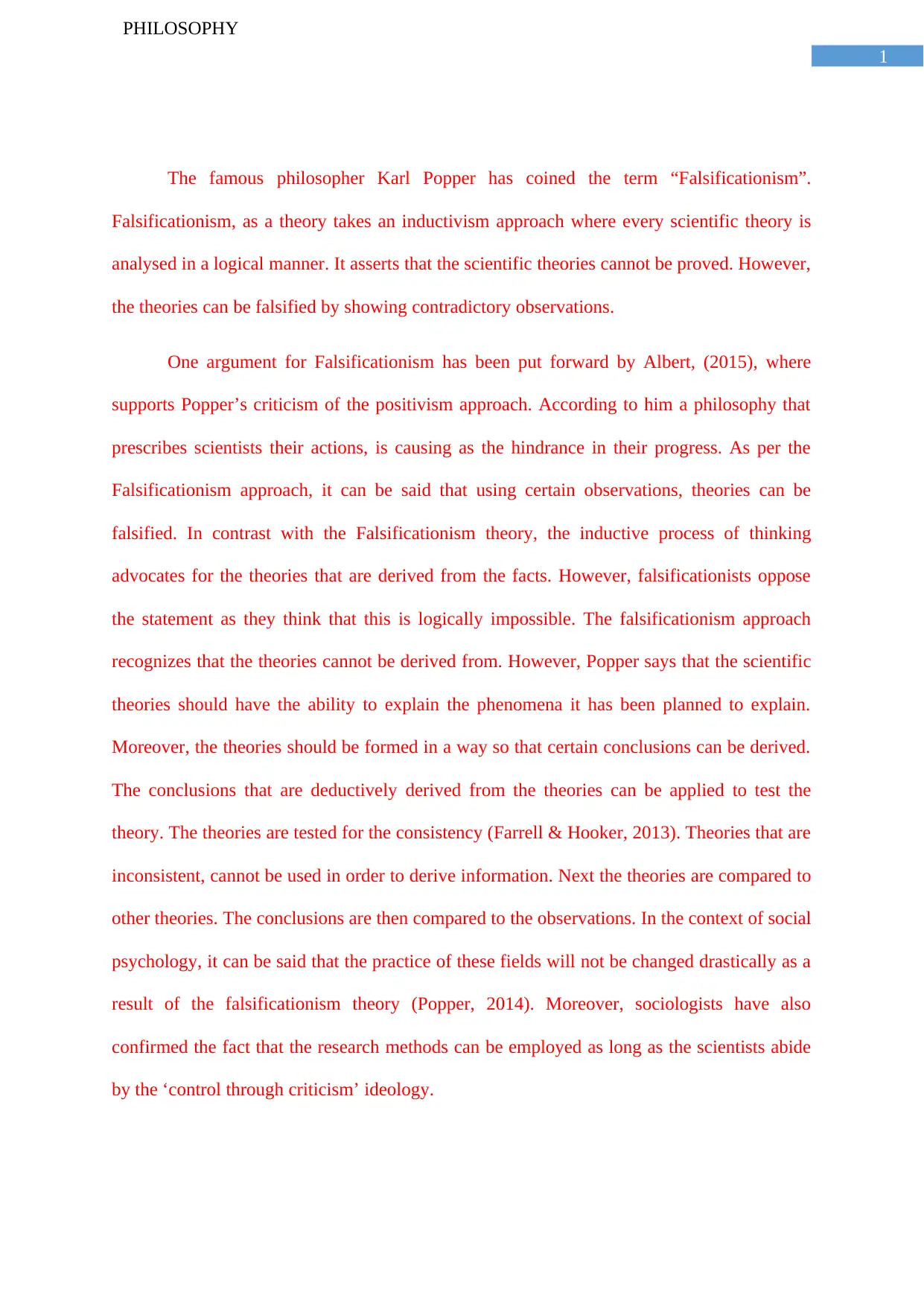
1
PHILOSOPHY
The famous philosopher Karl Popper has coined the term “Falsificationism”.
Falsificationism, as a theory takes an inductivism approach where every scientific theory is
analysed in a logical manner. It asserts that the scientific theories cannot be proved. However,
the theories can be falsified by showing contradictory observations.
One argument for Falsificationism has been put forward by Albert, (2015), where
supports Popper’s criticism of the positivism approach. According to him a philosophy that
prescribes scientists their actions, is causing as the hindrance in their progress. As per the
Falsificationism approach, it can be said that using certain observations, theories can be
falsified. In contrast with the Falsificationism theory, the inductive process of thinking
advocates for the theories that are derived from the facts. However, falsificationists oppose
the statement as they think that this is logically impossible. The falsificationism approach
recognizes that the theories cannot be derived from. However, Popper says that the scientific
theories should have the ability to explain the phenomena it has been planned to explain.
Moreover, the theories should be formed in a way so that certain conclusions can be derived.
The conclusions that are deductively derived from the theories can be applied to test the
theory. The theories are tested for the consistency (Farrell & Hooker, 2013). Theories that are
inconsistent, cannot be used in order to derive information. Next the theories are compared to
other theories. The conclusions are then compared to the observations. In the context of social
psychology, it can be said that the practice of these fields will not be changed drastically as a
result of the falsificationism theory (Popper, 2014). Moreover, sociologists have also
confirmed the fact that the research methods can be employed as long as the scientists abide
by the ‘control through criticism’ ideology.
PHILOSOPHY
The famous philosopher Karl Popper has coined the term “Falsificationism”.
Falsificationism, as a theory takes an inductivism approach where every scientific theory is
analysed in a logical manner. It asserts that the scientific theories cannot be proved. However,
the theories can be falsified by showing contradictory observations.
One argument for Falsificationism has been put forward by Albert, (2015), where
supports Popper’s criticism of the positivism approach. According to him a philosophy that
prescribes scientists their actions, is causing as the hindrance in their progress. As per the
Falsificationism approach, it can be said that using certain observations, theories can be
falsified. In contrast with the Falsificationism theory, the inductive process of thinking
advocates for the theories that are derived from the facts. However, falsificationists oppose
the statement as they think that this is logically impossible. The falsificationism approach
recognizes that the theories cannot be derived from. However, Popper says that the scientific
theories should have the ability to explain the phenomena it has been planned to explain.
Moreover, the theories should be formed in a way so that certain conclusions can be derived.
The conclusions that are deductively derived from the theories can be applied to test the
theory. The theories are tested for the consistency (Farrell & Hooker, 2013). Theories that are
inconsistent, cannot be used in order to derive information. Next the theories are compared to
other theories. The conclusions are then compared to the observations. In the context of social
psychology, it can be said that the practice of these fields will not be changed drastically as a
result of the falsificationism theory (Popper, 2014). Moreover, sociologists have also
confirmed the fact that the research methods can be employed as long as the scientists abide
by the ‘control through criticism’ ideology.
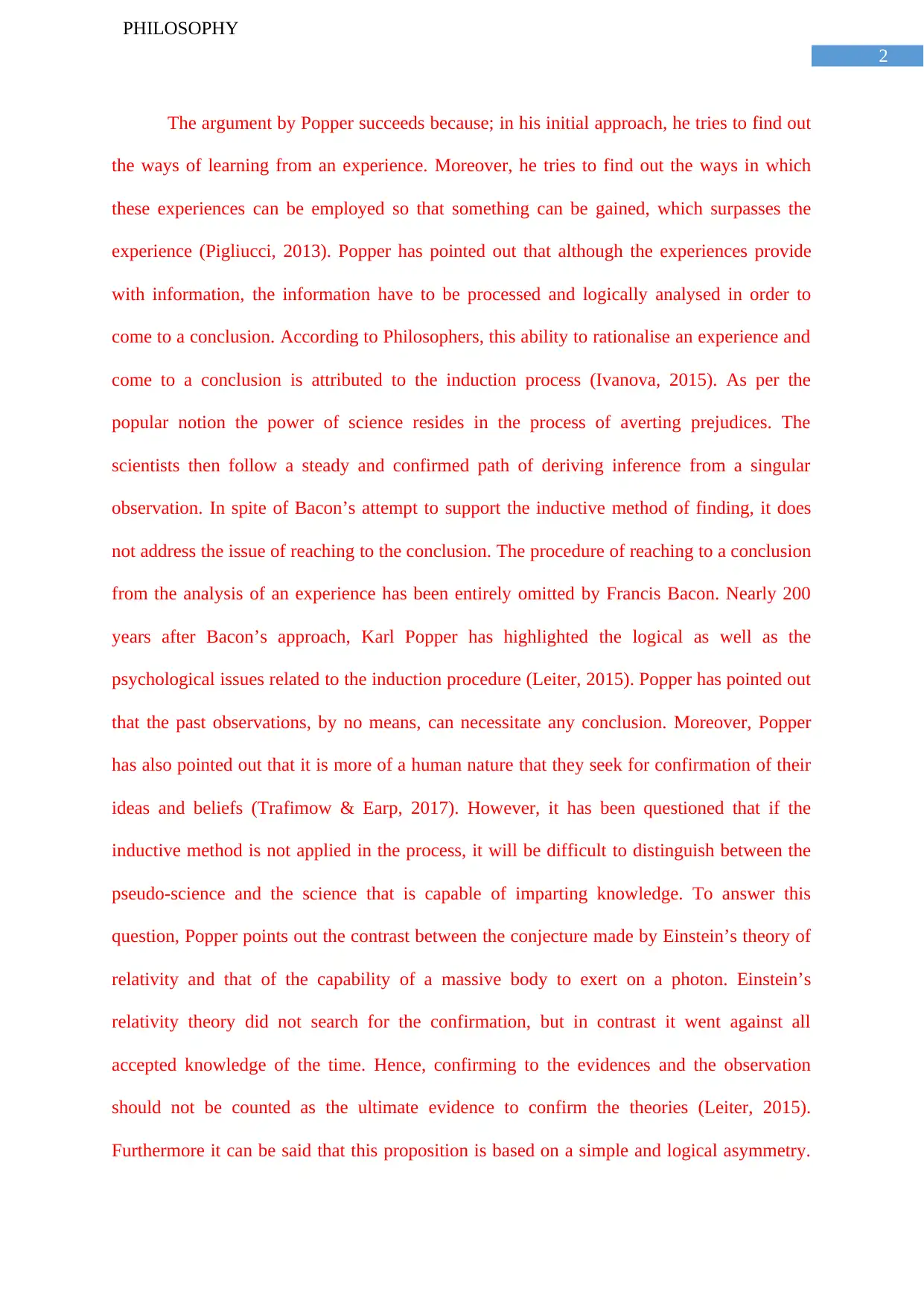
2
PHILOSOPHY
The argument by Popper succeeds because; in his initial approach, he tries to find out
the ways of learning from an experience. Moreover, he tries to find out the ways in which
these experiences can be employed so that something can be gained, which surpasses the
experience (Pigliucci, 2013). Popper has pointed out that although the experiences provide
with information, the information have to be processed and logically analysed in order to
come to a conclusion. According to Philosophers, this ability to rationalise an experience and
come to a conclusion is attributed to the induction process (Ivanova, 2015). As per the
popular notion the power of science resides in the process of averting prejudices. The
scientists then follow a steady and confirmed path of deriving inference from a singular
observation. In spite of Bacon’s attempt to support the inductive method of finding, it does
not address the issue of reaching to the conclusion. The procedure of reaching to a conclusion
from the analysis of an experience has been entirely omitted by Francis Bacon. Nearly 200
years after Bacon’s approach, Karl Popper has highlighted the logical as well as the
psychological issues related to the induction procedure (Leiter, 2015). Popper has pointed out
that the past observations, by no means, can necessitate any conclusion. Moreover, Popper
has also pointed out that it is more of a human nature that they seek for confirmation of their
ideas and beliefs (Trafimow & Earp, 2017). However, it has been questioned that if the
inductive method is not applied in the process, it will be difficult to distinguish between the
pseudo-science and the science that is capable of imparting knowledge. To answer this
question, Popper points out the contrast between the conjecture made by Einstein’s theory of
relativity and that of the capability of a massive body to exert on a photon. Einstein’s
relativity theory did not search for the confirmation, but in contrast it went against all
accepted knowledge of the time. Hence, confirming to the evidences and the observation
should not be counted as the ultimate evidence to confirm the theories (Leiter, 2015).
Furthermore it can be said that this proposition is based on a simple and logical asymmetry.
PHILOSOPHY
The argument by Popper succeeds because; in his initial approach, he tries to find out
the ways of learning from an experience. Moreover, he tries to find out the ways in which
these experiences can be employed so that something can be gained, which surpasses the
experience (Pigliucci, 2013). Popper has pointed out that although the experiences provide
with information, the information have to be processed and logically analysed in order to
come to a conclusion. According to Philosophers, this ability to rationalise an experience and
come to a conclusion is attributed to the induction process (Ivanova, 2015). As per the
popular notion the power of science resides in the process of averting prejudices. The
scientists then follow a steady and confirmed path of deriving inference from a singular
observation. In spite of Bacon’s attempt to support the inductive method of finding, it does
not address the issue of reaching to the conclusion. The procedure of reaching to a conclusion
from the analysis of an experience has been entirely omitted by Francis Bacon. Nearly 200
years after Bacon’s approach, Karl Popper has highlighted the logical as well as the
psychological issues related to the induction procedure (Leiter, 2015). Popper has pointed out
that the past observations, by no means, can necessitate any conclusion. Moreover, Popper
has also pointed out that it is more of a human nature that they seek for confirmation of their
ideas and beliefs (Trafimow & Earp, 2017). However, it has been questioned that if the
inductive method is not applied in the process, it will be difficult to distinguish between the
pseudo-science and the science that is capable of imparting knowledge. To answer this
question, Popper points out the contrast between the conjecture made by Einstein’s theory of
relativity and that of the capability of a massive body to exert on a photon. Einstein’s
relativity theory did not search for the confirmation, but in contrast it went against all
accepted knowledge of the time. Hence, confirming to the evidences and the observation
should not be counted as the ultimate evidence to confirm the theories (Leiter, 2015).
Furthermore it can be said that this proposition is based on a simple and logical asymmetry.
⊘ This is a preview!⊘
Do you want full access?
Subscribe today to unlock all pages.

Trusted by 1+ million students worldwide
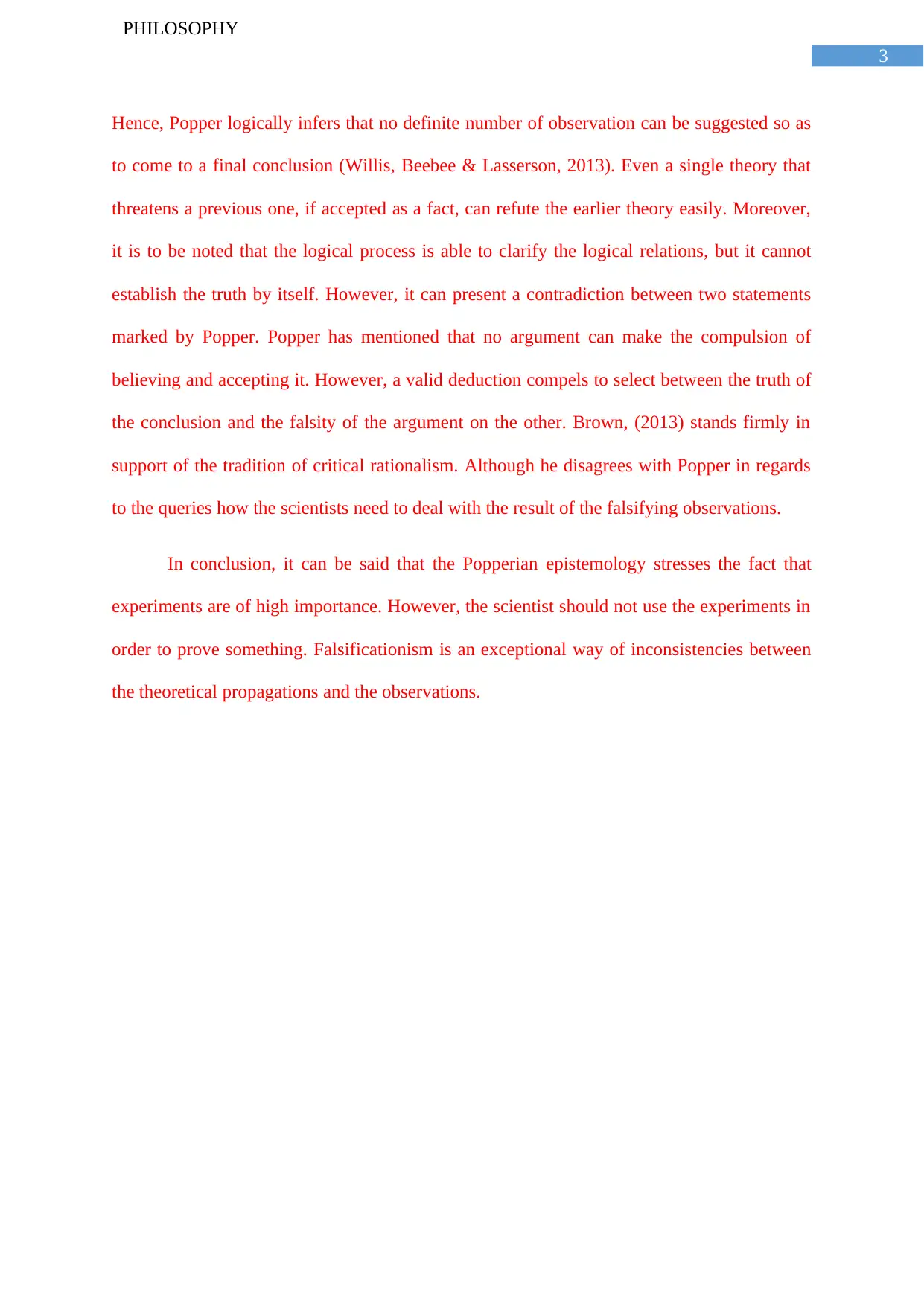
3
PHILOSOPHY
Hence, Popper logically infers that no definite number of observation can be suggested so as
to come to a final conclusion (Willis, Beebee & Lasserson, 2013). Even a single theory that
threatens a previous one, if accepted as a fact, can refute the earlier theory easily. Moreover,
it is to be noted that the logical process is able to clarify the logical relations, but it cannot
establish the truth by itself. However, it can present a contradiction between two statements
marked by Popper. Popper has mentioned that no argument can make the compulsion of
believing and accepting it. However, a valid deduction compels to select between the truth of
the conclusion and the falsity of the argument on the other. Brown, (2013) stands firmly in
support of the tradition of critical rationalism. Although he disagrees with Popper in regards
to the queries how the scientists need to deal with the result of the falsifying observations.
In conclusion, it can be said that the Popperian epistemology stresses the fact that
experiments are of high importance. However, the scientist should not use the experiments in
order to prove something. Falsificationism is an exceptional way of inconsistencies between
the theoretical propagations and the observations.
PHILOSOPHY
Hence, Popper logically infers that no definite number of observation can be suggested so as
to come to a final conclusion (Willis, Beebee & Lasserson, 2013). Even a single theory that
threatens a previous one, if accepted as a fact, can refute the earlier theory easily. Moreover,
it is to be noted that the logical process is able to clarify the logical relations, but it cannot
establish the truth by itself. However, it can present a contradiction between two statements
marked by Popper. Popper has mentioned that no argument can make the compulsion of
believing and accepting it. However, a valid deduction compels to select between the truth of
the conclusion and the falsity of the argument on the other. Brown, (2013) stands firmly in
support of the tradition of critical rationalism. Although he disagrees with Popper in regards
to the queries how the scientists need to deal with the result of the falsifying observations.
In conclusion, it can be said that the Popperian epistemology stresses the fact that
experiments are of high importance. However, the scientist should not use the experiments in
order to prove something. Falsificationism is an exceptional way of inconsistencies between
the theoretical propagations and the observations.
Paraphrase This Document
Need a fresh take? Get an instant paraphrase of this document with our AI Paraphraser
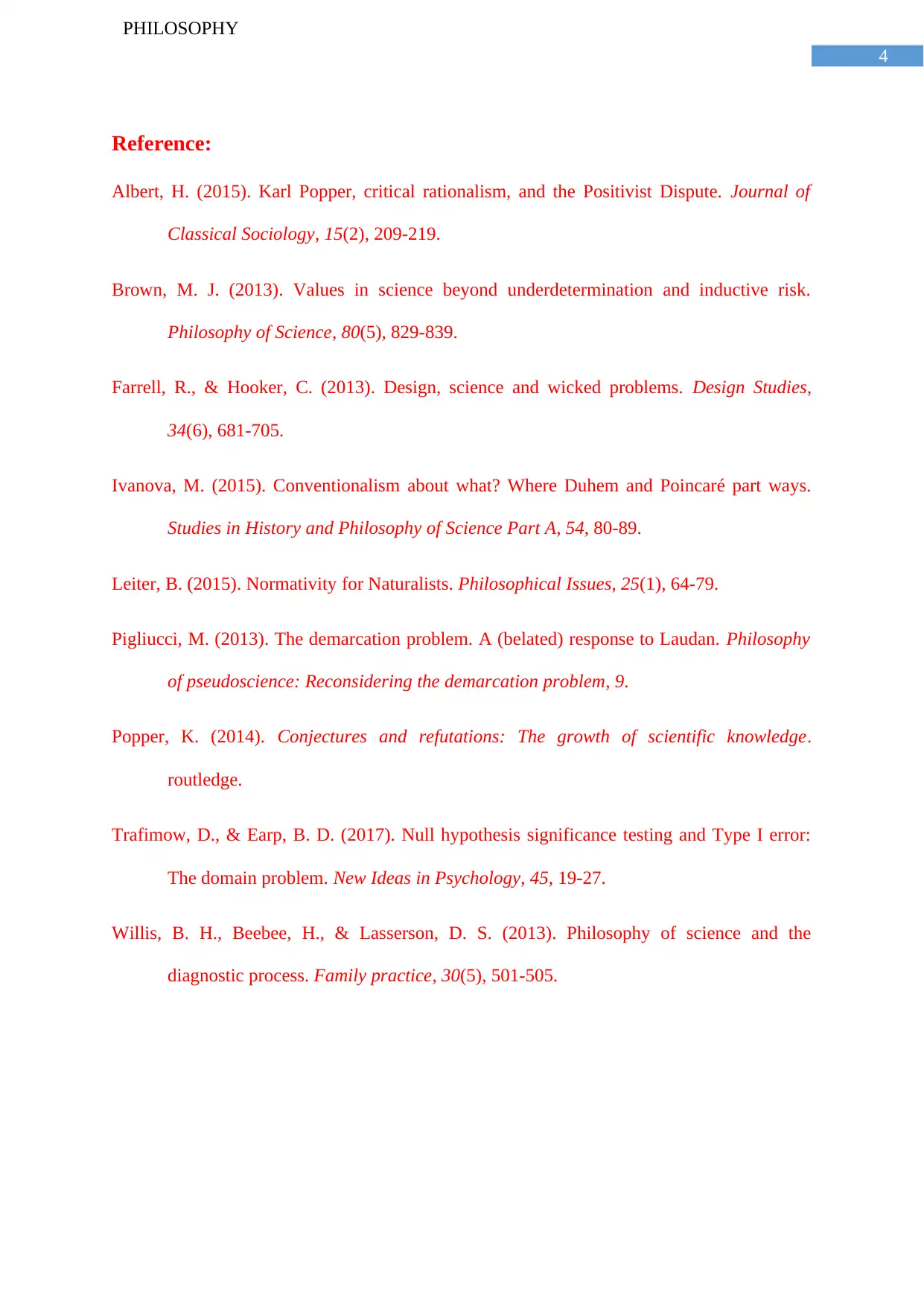
4
PHILOSOPHY
Reference:
Albert, H. (2015). Karl Popper, critical rationalism, and the Positivist Dispute. Journal of
Classical Sociology, 15(2), 209-219.
Brown, M. J. (2013). Values in science beyond underdetermination and inductive risk.
Philosophy of Science, 80(5), 829-839.
Farrell, R., & Hooker, C. (2013). Design, science and wicked problems. Design Studies,
34(6), 681-705.
Ivanova, M. (2015). Conventionalism about what? Where Duhem and Poincaré part ways.
Studies in History and Philosophy of Science Part A, 54, 80-89.
Leiter, B. (2015). Normativity for Naturalists. Philosophical Issues, 25(1), 64-79.
Pigliucci, M. (2013). The demarcation problem. A (belated) response to Laudan. Philosophy
of pseudoscience: Reconsidering the demarcation problem, 9.
Popper, K. (2014). Conjectures and refutations: The growth of scientific knowledge.
routledge.
Trafimow, D., & Earp, B. D. (2017). Null hypothesis significance testing and Type I error:
The domain problem. New Ideas in Psychology, 45, 19-27.
Willis, B. H., Beebee, H., & Lasserson, D. S. (2013). Philosophy of science and the
diagnostic process. Family practice, 30(5), 501-505.
PHILOSOPHY
Reference:
Albert, H. (2015). Karl Popper, critical rationalism, and the Positivist Dispute. Journal of
Classical Sociology, 15(2), 209-219.
Brown, M. J. (2013). Values in science beyond underdetermination and inductive risk.
Philosophy of Science, 80(5), 829-839.
Farrell, R., & Hooker, C. (2013). Design, science and wicked problems. Design Studies,
34(6), 681-705.
Ivanova, M. (2015). Conventionalism about what? Where Duhem and Poincaré part ways.
Studies in History and Philosophy of Science Part A, 54, 80-89.
Leiter, B. (2015). Normativity for Naturalists. Philosophical Issues, 25(1), 64-79.
Pigliucci, M. (2013). The demarcation problem. A (belated) response to Laudan. Philosophy
of pseudoscience: Reconsidering the demarcation problem, 9.
Popper, K. (2014). Conjectures and refutations: The growth of scientific knowledge.
routledge.
Trafimow, D., & Earp, B. D. (2017). Null hypothesis significance testing and Type I error:
The domain problem. New Ideas in Psychology, 45, 19-27.
Willis, B. H., Beebee, H., & Lasserson, D. S. (2013). Philosophy of science and the
diagnostic process. Family practice, 30(5), 501-505.
1 out of 5
Related Documents
Your All-in-One AI-Powered Toolkit for Academic Success.
+13062052269
info@desklib.com
Available 24*7 on WhatsApp / Email
![[object Object]](/_next/static/media/star-bottom.7253800d.svg)
Unlock your academic potential
© 2024 | Zucol Services PVT LTD | All rights reserved.





